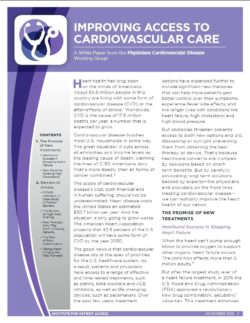Improving Access to Cardiovascular Care
November 6, 2016
 Heart health has long been on the minds of Americans. About 85.6 million people in this country are living with some form of cardiovascular disease (CVD) or the after-effects of stroke. Worldwide, CVD is the cause of 17.3 million deaths per year, a number that is expected to grow.
Heart health has long been on the minds of Americans. About 85.6 million people in this country are living with some form of cardiovascular disease (CVD) or the after-effects of stroke. Worldwide, CVD is the cause of 17.3 million deaths per year, a number that is expected to grow.
Cardiovascular disease touches most U.S. households in some way. The great equalizer, it cuts across all ethnicities and income levels as the leading cause of death, claiming the lives of 2,150 Americans daily. That’s more deadly than all forms of cancer combined.
The scope of cardiovascular disease’s cost, both financial and in human suffering, should not be underestimated. Heart disease costs the United States an estimated $30.7 billion per year. And the situation is only going to grow worse: The American Heart Association projects that 40.5 percent of the U.S. population will have some form of CVD by the year 2030.
The good news is that cardiovascular disease sits at the apex of priorities for the U.S. healthcare system. As a result, patients and physicians have access to a range of effective and time-tested treatments, such as statins, beta blockers and ACE inhibitors, as well as life-changing devices, such as pacemakers. Over the past few years, treatment options have expanded further to include significant new therapies that can help more patients gain better control over their symptoms, experience fewer side effects, and live longer lives with conditions like heart failure, high cholesterol and high blood pressure.
But obstacles threaten patients’ access to both new options and old, dissuading or outright preventing them from obtaining the best therapy or device. That’s because healthcare concerns are trumped by decisions based on short-term benefits. But by carefully advocating long-term solutions backed by experts—the physicians and providers on the front lines treating cardiovascular disease— we can radically improve the heart health of our nation.
Tags: Cardiovascular, Cost Sharing, Prior Authorization, Step TherapyCategorized in: Policy Papers, White Papers

